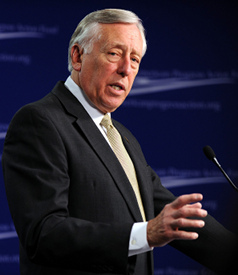
Washington – House Majority Leader Steny Hoyer, D-Md., plans to detail Friday what’s expected to be his party’s rallying cry in this year’s congressional elections: Republicans can’t be trusted, and remember the economic horrors of the Bush administration.
Democrats have been trying for weeks to divert attention from the fact that the economy remains sluggish and the employment picture weak despite their $862 billion 2009 economic stimulus package.
Hoyer plans to paint the election as “a choice between two dramatically different directions. And our decision really comes down to three questions. How far have we come? What remains to be done? And which party will keep moving us forward?”
Republicans counter that the Democrats’ efforts to prime the economic pump with government spending have sent the federal deficit skyrocketing and stifled private businesses.
On Thursday, Senate GOP leader Mitch McConnell of Kentucky said in a floor speech that his was the party of economic growth.
“For more than a year and a half, the president and his Democrat allies on Capitol Hill have pushed an anti-business, anti-jobs agenda on the American people in the form of one massive government intrusion after another,” McConnell said.
“In the middle of a debt crisis, Democrats can’t seem to pass trillion-dollar spending bills fast enough,” he said. “And in the middle of a jobs crisis, they continue to push one bill after another containing job-stifling taxes, new rules and regulations, and government intrusion into business.”
Hoyer plans to detail his views at a speech Friday to the Center for American Progress, a research group that’s considered sympathetic to Democrats. An advance text was made available Thursday.
In recent weeks, Hoyer has been a point man for Democratic initiatives. He recently spoke to a Washington budget conference and suggested looking at changes in Social Security and Medicare to help stem rising federal debt.
On Friday, he plans not only to emphasize the contrast with Republicans, but also to lay out a jobs-creating agenda for the rest of this year. It’s a modest agenda, however, one that reflects not only the reluctance of centrist Democrats to add to the federal deficit — estimated to be about $1.5 trillion this fiscal year — but also Congress’ eagerness to go home and campaign.
The House of Representatives plans to adjourn next Friday and not return until Sept. 14.
Hoyer will say that the Democratic policies are working, as he discusses “the disaster we have to this point averted as a result of actions we have taken,” a point widely disputed by Republicans, who say record government spending is making it harder for the economy to grow.
“A mere year and a half ago,” Hoyer plans to say, “Economists across the spectrum were talking in all seriousness about the risk of a second Great Depression. Instead, we’ve stabilized the financial system, injected demand into the economy and created jobs.”
“That progress started with vital investments, not just in our immediate recovery, but in the foundations of prosperity for years to come. We are rebuilding the roads, railways and bridges that are our economy’s backbone,” he says.
Hoyer also discusses the health care and financial regulation overhauls enacted this year, largely without Republican support; GOP lawmakers have suggested repealing both.
“All of those policies have a common thread: After a lost decade, middle-class Americans now have a Congress and administration that is helping it make up the lost ground and building for future prosperity,” he says.
Now, he says, Democrats will push what they call “a comprehensive strategy to boost American manufacturing.”
Among the proposals:
- The U.S. Manufacturing Enhancement Act, which passed the House on Wednesday, and which makes it easier for American companies to get the materials they need to manufacture goods;
- The SECTORS Act, which also passed the House last week, and which forms partnerships between businesses, unions, and educators to train workers for some of the most needed 21st-century jobs;
- The National Manufacturing Strategy Act, which will direct the president to develop a manufacturing strategy for the nation every four years;
- The End the Trade Deficit Act, which will lead to the development of policies to reduce the trade deficit; and
- The Clean Energy Technology Manufacturing and Export Assistance Act, which will ensure that clean energy technology firms have the information and assistance they need to compete at home and abroad.
- The Ways and Means Committee is also going to look at legislation that addresses China’s currency policy
The biggest battle later this year, though, could be over whether to extend most of the George W. Bush administration’s tax cuts.
Republicans want the reductions, which expire at the end of this year, continued. President Barack Obama and most Democrats want to limit any extension to individuals who earn less than $200,000 a year and couples who make less than $250,000.
We have 10 days to raise $50,000 — we’re counting on your support!
For those who care about justice, liberation and even the very survival of our species, we must remember our power to take action.
We won’t pretend it’s the only thing you can or should do, but one small step is to pitch in to support Truthout — as one of the last remaining truly independent, nonprofit, reader-funded news platforms, your gift will help keep the facts flowing freely.